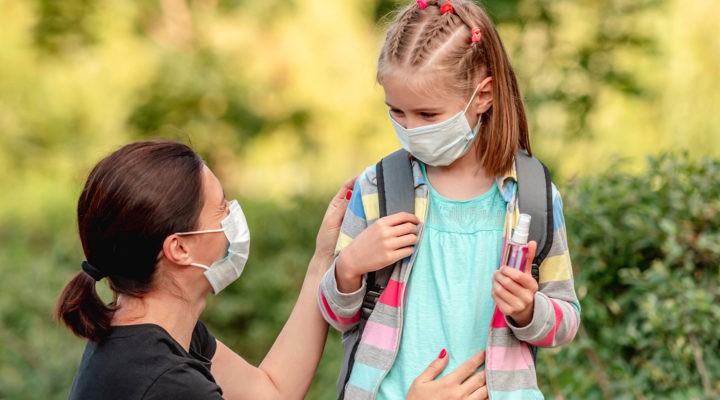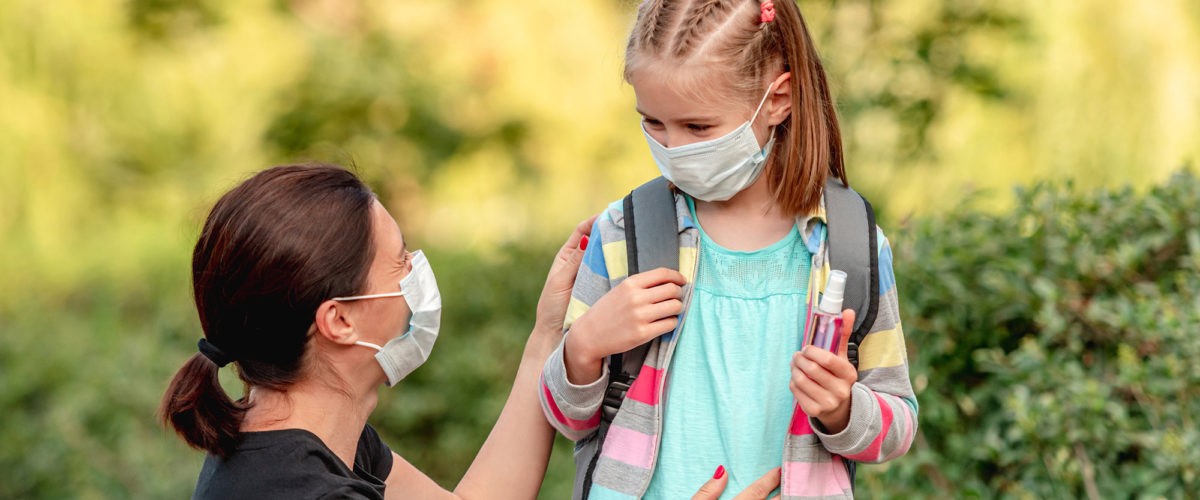Recently, in the parking lot outside my office, I cried in my car for 10 minutes before work. This was after listening to my local NPR affiliate interview a parent from my son’s school.
In her remarks, this parent calmly discussed her decision to begin organizing a grassroots, parent-led contact tracing program in response to the exponential rise of COVID-19 cases among our own children because our school system refuses to do so.
Now, a daily part of my early-morning routine, before making breakfast and packing lunch, is to check the Excel spreadsheet for my son’s grade to see if his classmates’ test results have come back, if I should keep him home due to exposure, or if he’ll have at least 60% of his class present for the first time in more than a week.

Eric Minton
If our kids are sick, or test positive for COVID-19, it’s up to us parents to decide if they go to school, or not. It’s up to us parents to contact teachers and administrators about makeup work and next steps if we stay home, or not. It’s up to us parents to call and email other families to let them know about a positive result, or not. It’s up to us parents to send our kids to school in masks, or not. It’s up to us parents to let them eat maskless in the crowded cafeteria, or not. It’s up to us parents to pull our children out of public school altogether, or not.
Either way:
It’s up to us parents.
It’s up to us parents.
It’s up to us parents.
Because, as our local school board, our superintendent, and our governor remind us each time our exhausted pleas for support reach their ears and overfull email inboxes, “parents know best” and have a “choice” about what we do with our kids in the midst of a global pandemic where school is mandatory but public health and common sense aren’t.
As a marriage and family therapist working largely with adolescents and their families, I’ve come across a word for what many of us raising kids here, at the end of the world, are currently feeling: parentification.
“I’ve come across a word for what many of us raising kids here, at the end of the world, are currently feeling: parentification.”
Like most psychotherapeutic terminology, parentification is a made-up word to describe such familiar human experiences that, when you hear them defined, you ask, “I’m paying exactly how much an hour for you to tell me something I already know?”
Speaking clinically, parentification is what happens when a child is implicitly or explicitly mandated by a family system to become a caregiver to his or her parents rather than being reliably cared for by them. While parentification takes many forms, it often involves children performing developmentally inappropriate tasks whenever their parents are incapacitated by addiction, divorce, unemployment, crisis or even their own attachment-based injuries.
Parentification, for example, happens when children are made to be emotionally stable to avoid “upsetting” their mothers, or when children work two jobs to cover the cost of their dad stealing money from their piggybanks to buy weed. It is the internalized responsibility children feel to maintain and even “save” the family system, despite the ludicrousness of this messaging whenever we hear them say it out loud.
Which is why, whenever middle schoolers attempting to survive their parents’ divorce sit in my office and, with tears in their eyes, guiltily admit that they were responsible for the dissolution of their parents’ marriage, I usually respond with: “Oh, well that makes sense. After all, you are 12 years old, and you did start kind of letting yourself go once your sister was born.”
“Parenting a child in America right now, especially if you live in a state or region ruled by a Republican supermajority, isn’t too terribly different an experience than being a middle schooler who feels guilty for their parents’ divorce.”
Parenting a child in America right now, especially if you live in a state or region ruled by a Republican supermajority, isn’t too terribly different an experience than being a middle schooler who feels guilty for their parents’ divorce. Every day is chaotic, stressful and leaves you with the aching sense that the adults in the room are untrustworthy at best and selfish at worst. In this world, the messaging is always: work harder, read more, do more, learn more, and take more responsibility because you’re on your own, and if you want to make it out of this thing alive, you better grow up and get your shit together, or don’t.
Either way:
It’s up to you.
It’s up to you.
It’s up to you.
One of the most psychologically damaging impacts of parentification is that it often goes unacknowledged. Over a long enough time, parentified relationships end up creating implicit binds trapping us in abusive and developmentally inappropriate interactions with our caregivers and remove an opportunity for us to directly comment on just how out of control all this is. I’m saying the worst part of parentification isn’t that it sometimes happens; it is that, over time, we start to believe it’s normal.
When parentification becomes normal, those of us who refuse to suffer silently under its weight become the problem. Our pain and questions become annoying, and confusing, and heretical, and unpatriotic, and unfaithful, and serve as yet more evidence of why we are worthy of being ignored, or maligned, or rejected altogether.
I have to say, I’ve never felt more alone than I did in the years following my parents’ divorce, until that is, I began parenting an elementary schooler in East Tennessee during the past year and a half.
I am reminded that as a kid it wasn’t until someone, or I should say a group of someones, came alongside me and made unbroken eye contact with my pain and my experiences without shaming or ignoring me, that I was finally able to learn the truth about what I had grown accustomed to surviving: I learned that I’m not alone. I learned that I’m not wrong to be in pain, and I learned that continuing to take responsibility for things that never were mine to do, or fix, or control will only kill me and everyone I try to raise.
“Remember that none of this is normal, but the anxious and depressed hopelessness you’re feeling might be.”
So may you, as you organize contact-tracing Excel spreadsheets for your middle schooler, ceaselessly call your school board representative, read ever-changing CDC guidelines before sending your kids to outdoor birthday parties, and hoard rapid tests in advance of the Labor Day infection bump, remember that none of this is normal, but the anxious and depressed hopelessness you’re feeling might be.
May you remember that in many ways it isn’t possible for you to totally repair a gutted health care infrastructure or convince vaccine skeptics to care for themselves and their loved ones by finally getting a shot or demand that other families take appropriate measures to mitigate the impact of COVID-19 throughout your community.
May you remember that you are one person, but that doesn’t mean you are alone, or wrong to be in pain, or shouldn’t be buckling under the weight of a responsibility that never was meant for you to bear singularly.
Rejecting this responsibility isn’t selfishness or a way of burying your head in the sand; it is an act of resistance to a system, to leaders, and to adults who refuse to parent us in ways we deserve. What saves parentified teenagers from abusive family systems is the same thing that saves parentified adults from abusive socio-political systems: collective acts of trustworthy love and creative solidarity.
When exhausted parents, anxious teenagers, chewed-up educators, depressed Millennials, ground-down retail workers, burned-out Gen-Xers, and restless Boomers struggling with retirement stop competing with one another and start banding together, offering support, and creatively building an alternative future out of the wreckage of the present, we end up becoming the leaders and parents we deserved in the first place: for each other, and for those coming after us.
Either way, even if it doesn’t immediately work, or our leaders ignore us (as my local school board did most recently), or others reject our offers of solidarity, at least we won’t be crying alone in our cars anymore.
Because now, we cry together.
Eric Minton is a writer, ordained Baptist minister and licensed psychotherapist specializing in marriage and family therapy. He has a family therapy practice in Knoxville, Tenn., and provides coaching and consultation for pastors, nonprofit leaders, businesspeople and institutions, helping them foster better ways of living, working and serving together. His first book, It’s Not You, It’s Everything, will be released in May 2022 with Broadleaf Press. Find more of his work at ericminton.me
Related articles:
Lessons learned during the pandemic as a parent who found joy in the desert | Opinion by Rick Pidcock
Give yourself some grace during the pandemic | Opinion by Brett Younger


